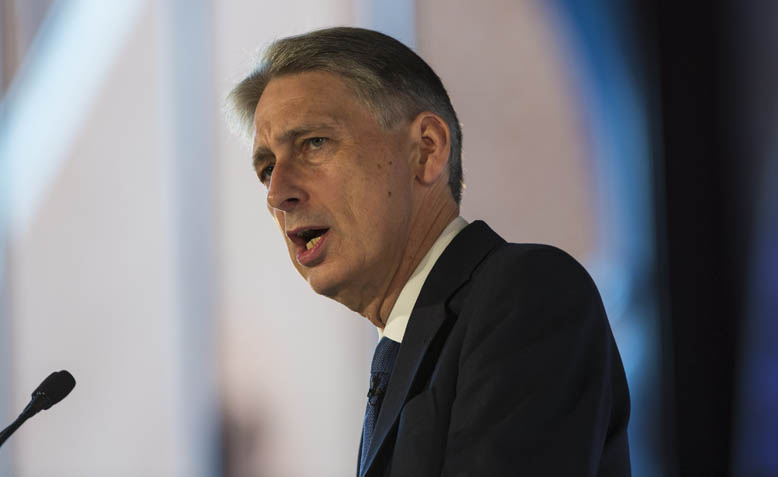 Chancellor of the Exchequer, Philip Hammond, speaking at Chatham House. Source: Flickr / Chatham House
Chancellor of the Exchequer, Philip Hammond, speaking at Chatham House. Source: Flickr / Chatham House
The Tories have no answers to the problems facing British society
On Tuesday, Philip Hammond released the Spring Budget Statement to Parliament. It is only the second in this format of a minor statement without press now the main Budget is presented in the Autumn, ostensibly to give working families a better chance to plan for whatever tweaks the Conservatives dream up. It is not a thrill-packed 25 minutes even by the standards of Conservative finance, despite Hammond’s claim to be feeling ‘Tigger-like’ in the face of John McDonnell’s Eeyore. He used this stale joke to criticise Labour for talking down the British public when we should really be feeling positive. A feeble disingenuity when we know that it is his administration that Labour have been attacking in favour of solidarity with the wider public.
One of his flagship points is that the OBR (Office for Budget Responsibility) have predicted a growth figure of 1.5% for 2018, up from the previous prediction of 1.4%, so that’s us told. To present this as a reason to be cheerful shows that the Chancellor and Tory administration continue to be woefully out of touch with the lived realities and concerns of most people. Can we really expect that this meagre prediction (not even a statistic at this point) and ones like it will result in a meaningful change in the conditions that have produced incredible levels of inequality and poverty in the UK? In addition, he crows that the debt as a percentage of the GDP will fall to 85.5% in 2018/19, after claiming that ‘forecasts are there to be beaten.’ This is all very well but this same yardstick was measured at 57.1% when the Conservatives took office. This makes Hammond’s attempt to smear Corbyn and McDonnell for their massive borrowing plans seem a little hollow, despite his demand to ‘judge me by my record’.
He says that Labour would be unable to deal with the inevitable financial crises of the future (feeling it more important to claim Labour was naïve for not accepting them than taking responsibility as the incumbent government for mitigating their effects). So, if we’re judging people by their record, let’s never forget that the Conservative-supervised bank bailout during the crash of 2008 was £850bn.
Perhaps his concern about financial crises would lead to addressing the instability of rampant corporate capital? As it happens, no. The only flicker of passion, strangely buried in the middle of the statement, comes when he criticises Labour for their reservations about the market economy and assures listeners that the Conservatives are proudly for it. He claims that the free market ‘embraces talent and opportunity.’ Although he mocks Labour’s ‘ideological’ stances, this is explicit support of an ideology that demonstrably favours those who already have wealth and power. It is only another version of the old Conservative line that the free market provides a level playing field if only people would pull themselves up by the bootstraps and get a bit of honest work done.
Most of the statement is totally unambitious (though he would clearly prefer the term ‘balanced’), but this sole demonstration of any real fervour about the free market economy is also the most obviously peculiar and confused. He claims that the Market Economy creates much-needed tax revenues and in the same breath reveals that business rates will be cut by £10bn. He also points out that the low-end tax threshold has been raised to alleviate the burden on the lowest earners. Of course, we should look to do this, but since the Autumn budget last year, tax on those earning £150,000 or more p.a. was lowered to 45% from 50%.
The poorest people in society by definition already have very little to give, whereas 5% of all earnings over £150,000 in the UK would be an extraordinary figure. Even though the ideology of taxation appears to be important to Hammond here, he is clearly unable to square the Conservative Party’s desire to project an image of fair-handedness with their attachment to business. He claims the Tories are ‘the party of small business’, to promote their commitment to entrepreneurship, as though the support of big business is a second priority.
At moments, his audacity is astonishing. He presents British arts, culture, and universities as aspects of the nation we should be proud of. As a standalone statement, this is of course true. However, the feeling palls when we hear this from the financial representative of a Government that has overseen staggering cuts to local arts funding and when we are currently witnessing a historically important struggle between University employees and management. He also boasts about enormous spending on the NHS and in the education sector. Both of these areas are in crisis. This has been dealt with by Blairite and successive conservative governments by putting more and more in the hands of wealthy sponsors and market forces. This goes against the constant pleas of those who actually work in these sectors, unlike successive government ministers dealing with them.
His final subject is the environment. True to the style of the rest of the speech, it is not radical. An enquiry will be launched into whether the reduction of certain tariffs on greener fuels for the ‘white van man’ will clean up the air in urban areas. No mention of the role of unfettered overproduction of global capital.
His parting word is that ‘talent and hard work alone determine success’. We are left with another misguided iteration of Conservative ideology about the level playing field of free markets, and a particularly boring one at that.

